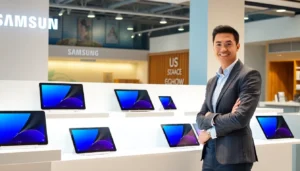In a world where silence is golden but audio technology is platinum, it’s time to crank up the volume on your understanding. From the tiny earbuds that fit snugly in your ears to the booming speakers that could wake the neighbors, audio tech is everywhere, transforming how we experience sound. Whether it’s your favorite podcast or the latest chart-topping hit, the right audio gear can turn any mundane moment into a symphonic adventure.
Table of Contents
ToggleOverview of Audio Technology
Audio technology encompasses various tools and systems that enhance sound quality and accessibility. It includes devices like headphones, speakers, amplifiers, and soundbars that cater to diverse audio experiences. Users can find options for casual listening or professional mixing, ensuring everyone finds suitable solutions.
Modern audio technology significantly impacts how people consume content. Streaming services offer high-fidelity audio, allowing listeners to enjoy music and podcasts with clarity. Wireless technology plays a crucial role in this evolution, facilitating easy connectivity with devices like smartphones and tablets.
Innovations in audio technology also extend to virtual reality (VR) and augmented reality (AR). These platforms utilize spatial audio to create immersive environments, making experiences more engaging. Sound engineers increasingly employ sophisticated software and hardware in studios, resulting in higher production quality.
Consumer preferences shape audio technology trends. Compact earbuds designed for portability become popular among commuters, while audiophiles invest in premium sound systems. Manufacturers continually innovate, producing lightweight materials and improved battery life to accommodate user needs.
Accessibility remains a focus in audio technology. Features like voice activation and customizable sound profiles enhance usability for those with hearing impairments. Platforms incorporate tools that help individuals enjoy content in ways that suit their preferences.
Overall, audio technology transforms how people connect with sound, making it a vital part of daily life.
Types of Audio Technology

Audio technology encompasses various systems and devices that enhance sound experiences. Two primary categories exist: analog audio technology and digital audio technology.
Analog Audio Technology
Analog audio technology relies on continuous signals to represent sound. Vinyl records exemplify this, producing rich, warm tones enjoyed by many enthusiasts. Cassette tapes also fall into this category, offering a nostalgic listening experience despite their lower fidelity. Reel-to-reel tape systems provide high-quality sound for professionals, delivering clarity and depth. Devices like turntables exemplify the enduring appeal of analog formats, allowing users to connect intimately with music. This technology emphasizes a tactile experience, connecting users directly with the auditory medium.
Digital Audio Technology
Digital audio technology utilizes binary data to reproduce sound. Audio files encoded in formats such as MP3 and WAV dominate today’s music landscape. Streaming services rely heavily on this technology, providing access to vast libraries of high-fidelity audio. Digital signal processing enhances sound quality and allows for sophisticated effects, making it ideal for modern productions. Devices like smartphones and digital audio players leverage this technology for convenient playback and portability. Furthermore, innovations in digital sound transmission, including Bluetooth and Wi-Fi, enable seamless connectivity between devices, enhancing the overall user experience.
Applications of Audio Technology
Audio technology serves multiple purposes across various domains. From home entertainment to professional industry use, the impact shapes sound experiences remarkably.
Home Audio Systems
Home audio systems improve entertainment experiences significantly. High-fidelity speakers and soundbars enhance movie nights, while wireless technology enables convenient connectivity. Streaming services provide access to vast music libraries, making it easy to enjoy favorite tracks. Enhanced features include voice activation, which allows hands-free control of audio devices. Consumers appreciate the ability to customize sound settings, ensuring tailored listening experiences that suit individual preferences. Compact designs of modern speakers fit seamlessly into home environments, combining aesthetics with functionality.
Professional Audio Production
Professional audio production requires specialized technology to achieve compelling sound quality. This sector utilizes advanced equipment, such as microphones, mixers, and audio interfaces, to capture and manipulate sound accurately. Digital audio workstations (DAWs) dominate as essential tools for editing and producing music. Engineers rely on software to enhance recordings with effects and spatial audio techniques. Additionally, high-quality monitors provide accurate sound reproduction, essential for precise mixing decisions. Innovations in audio technology continue to streamline workflows, enabling faster production timelines and improved results for artists.
The Future of Audio Technology
Audio technology continues to evolve rapidly, shaping how individuals interact with sound. Innovations enhance not only personal listening experiences but also the overall accessibility of audio content.
Emerging Trends
Advancements in audio technology reflect consumer demands for convenience and quality. Compact and wireless devices now dominate the market, appealing to users who prioritize portability. High-resolution audio formats are gaining traction, offering enhanced clarity and detail that audiophiles appreciate. Companies are also prioritizing integration with smart home systems, making it easier for users to enjoy seamless audio experiences throughout their environments. Innovations such as 3D audio and spatial sound are creating immersive experiences that elevate the listening experience beyond traditional formats.
Impact of Artificial Intelligence
Artificial intelligence plays a significant role in audio technology’s future. AI algorithms now personalize sound settings, allowing users to enjoy tailored audio profiles. These intelligent systems can adapt to various environments and preferences, ensuring optimal sound quality. Additionally, AI enhances voice recognition features, streamlining interactions with smart speakers and audio devices. By analyzing listener habits, AI systems curate playlists that align with individual tastes, simplifying content discovery. The combination of AI with machine learning is transforming audio production, enabling faster and more efficient workflows for creators.
Audio technology’s evolution continues to redefine sound experiences across various aspects of life. With advancements in digital formats and wireless connectivity, users can enjoy high-quality audio anytime and anywhere. Innovations like spatial sound and AI-driven personalization are setting new standards for immersion and convenience.
As consumer preferences shift towards compact and versatile devices, the industry adapts to meet these demands. The future of audio technology promises even more exciting developments that will further enhance how individuals engage with sound. Whether for entertainment or professional use, audio technology remains a crucial element in shaping modern experiences.







